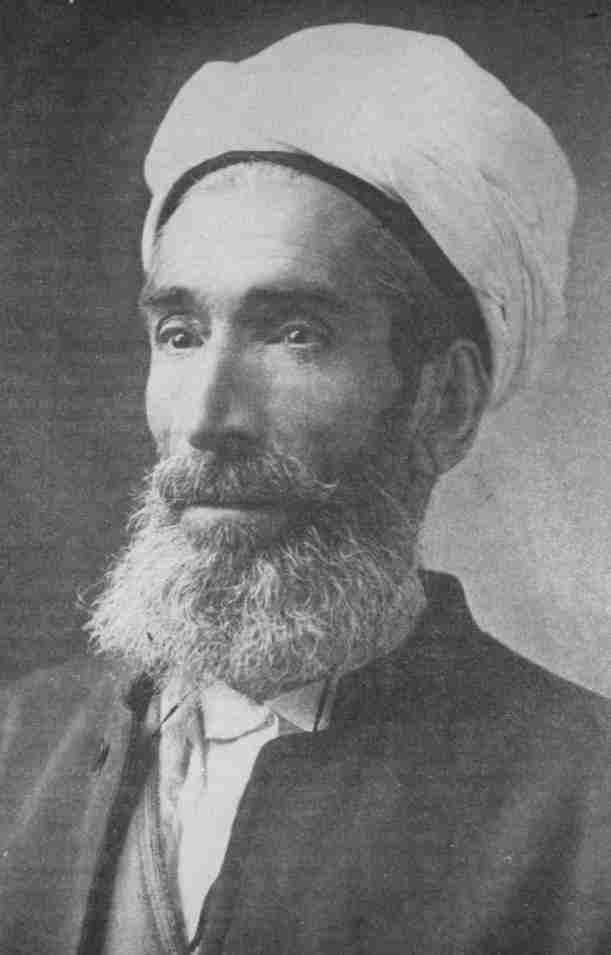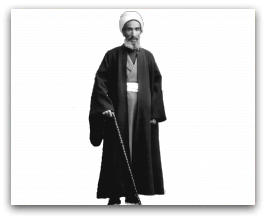MÃrzá Abu'l-Fadl
Mirza Muhammad (Persian ميرزا أبوالفضل ) or Mirza Abu'l -Fadl -i - Gulpaygani (* June or July 1844 at Gulpaygan, Iran, † January 21, 1914 in Cairo, Egypt ) was a leading Iranian Baha'i theologian and helped the Baha'i faith to spread in Egypt, Turkmenistan and the United States. Abdul- Baha gave him the honorary title of Abu'l- Faḍā'il ("Father of all righteousness "). Shoghi Effendi referred to him as an apostle of Bahá'u'lláh.
Life
Abu'l- Fadl was born in June or July in a village near Gulpaygan in Iran in a family known clergyman. Accordingly, he also received a broad education that rational and Gnostic philosophy, as well as the classical Islamic theology included. His intellectual interest included as well as many other areas, particularly the sciences in Europe and the Buddhism.
From October 1873 he taught " Kalam ", the speculative Islamic theology at the " Madrasih Hakim Hashim ", a religious academy in Tehran in Iran. In addition to teaching, Abu'l- Fadl worked there intensively with philosophy, " Irfan " Islamic mysticism, Buddhism and the natural sciences. In 1876 he came into contact with several Bahai. On September 20, 1876, he converted to the Baha'i faith, as the prophecies of Abdulaziz, the Sultan of the Ottoman Empire, and its vizier Mehmed Emin Ali Pasha of Baha'u'llah Lawh -i - Ra'is ( " panel to the ruler " ) and Lawh -i - Fu'ad ( " table of Fu'ad " ) came true. When he then took his new faith openly, he lost his job and was arrested several times, he spent a total of four of the next ten years in prison.
He started several mission trips in Iran to do and was able to gain many new believers. In 1889 he moved to Ashgabat in the Russian Empire (now Turkmenistan), where he became the focus of there newly developing Bahai communities. He traveled to Samarkand and Bukhara in the Russian Empire ( now Uzbekistan ). In 1894 he left Ashgabat and traveled to Acre in the Ottoman Empire (now Israel), where he spent ten months with Abdul- Baha. Then ( since 1882 but under British occupation ), he traveled to Cairo, Ottoman Empire where he was able to take a position at the Al -Azhar University as an Islamic scholar. Some of his students and other Egyptians consumed by him to the Baha'i faith.
1901 Abu'l -Fadl left on the instructions of Abdul- Baha towards Cairo and traveled to the United States to the local Baha'i the beliefs of the young religion bring closer detail, even to the heretical teachings of Ibrahim George Khayru'llah to refute. On the way to the United States he visited the Baha'i community in Paris, France. In Washington, he was portrayed in 1903 by Alice Pike Barney. In 1904 he left the United States and settled again in Cairo, where he died on 21 January 1914.
Honors
Abdul- Baha gave him the honorary title of Abu'l- Faḍā'il ("Father of all righteousness " ) and named one of the gates of the Shrine of the Bab after him. Shoghi Effendi calls him one of the Apostles of Bahá'u'lláh.
Writings
Abu'l- Fadl wrote some important works of the early Bahai theology in Arabic and Persian. These include the works of historical representations of the Babi and Baha'i religion, the doctrine of faith, of supporting evidence for the claim of Baha'u'llah, Introductions to the Baha'i faith for Jews, Christians and Zoroastrians, and defenses against apologetics against the Bahai religion. Some of the works have been translated into English, with the influence of his work is far greater than the number of translated works can guess it.
- The Brilliant Proof. Kalimat Press, Los Angeles, USA 1998, ISBN 189-0-68800-2 ( Online).
- Letters and Essays, 1886-1913. Kalimat Press, Los Angeles, USA 1985, ISBN 0-933-77036-7.
- The Bahá'í Proofs and A short Sketch of the History and Lives of the Leaders of this religion. Bahá'í Publishing Trust, Wilmette, Illinois, USA 1983, ISBN 0-877-43191-4.
- Miracles and Metaphors. Kalimat Press, Los Angeles, USA 1981, ISBN 0-933-77022-7.










